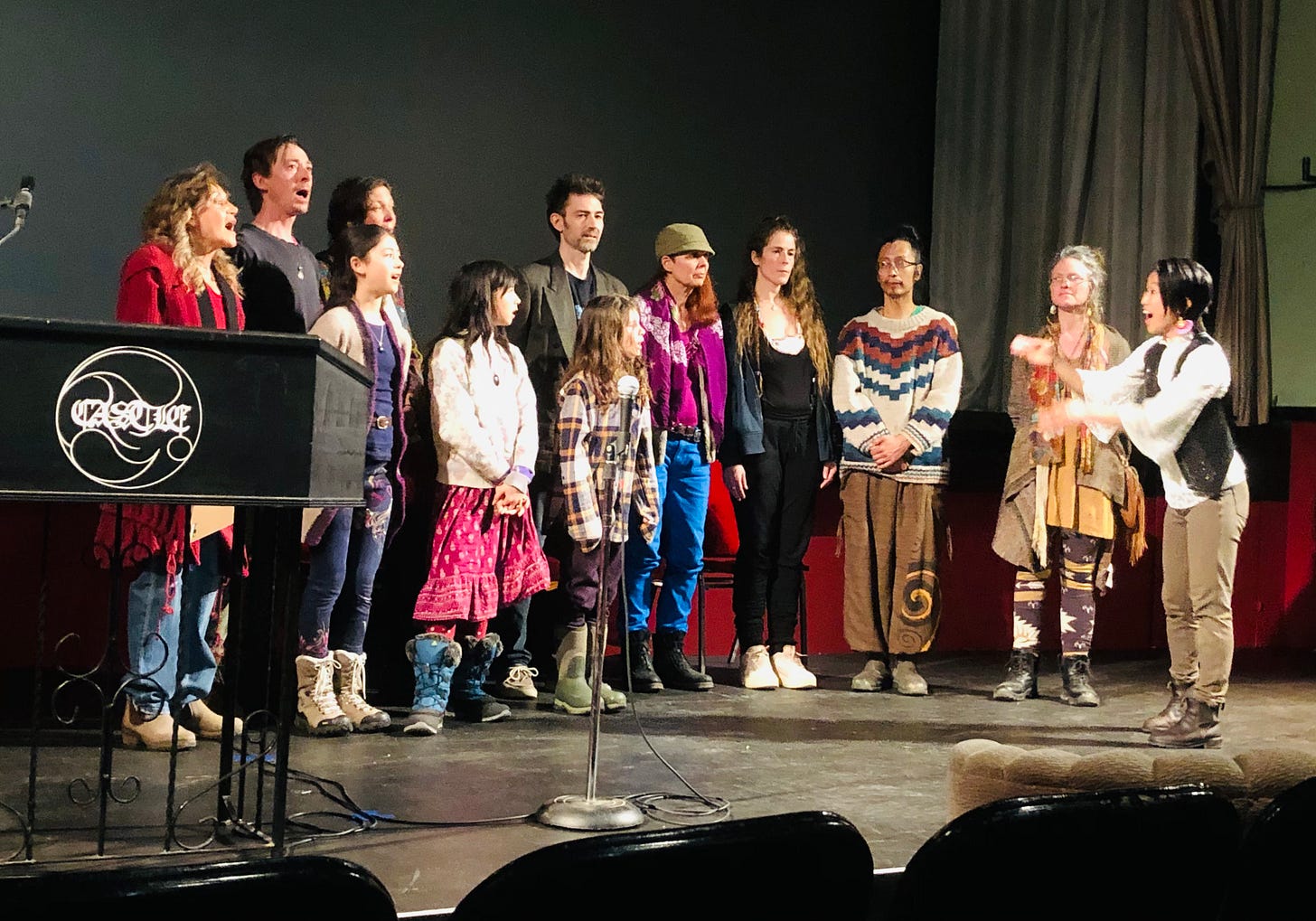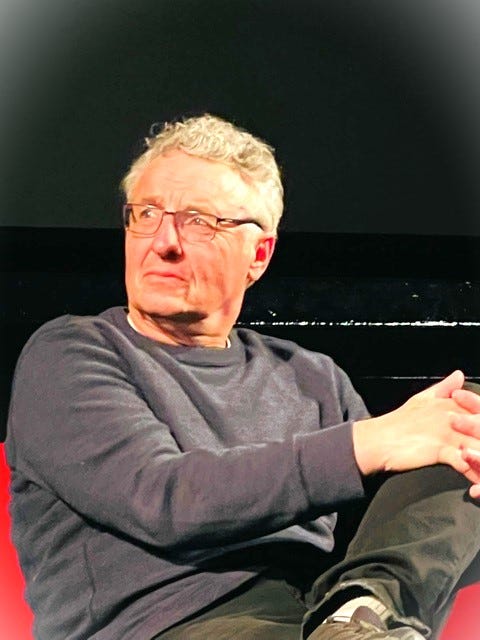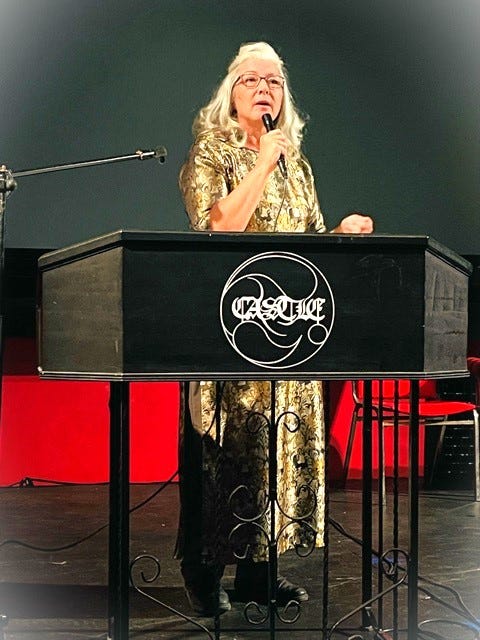Introduction
To those of us weary from fighting for what were once basic freedoms during the past three years, a little good news is as welcome as water to a parched land. Sadly, good news can be hard to find in an era when our governments seem to have decided that the golden era of civil liberties is now over. But like the partisans fighting in the French underground during WWII, whether the news is good or bad, we soldier on. From time to time some of us wounded must take time to heal in the First Aid stations of our homes and spiritual refuges. The West Kootenay-based Freedom Hub movement thus carries on in an attempt to rebuild the nucleus of our crumbling free society.
To that end, on the evening of March 22, Freedom Hub organizer Nadine Podmoroff hosted visiting guest speaker Paul Jaffe at the Old Castle Theatre in Castlegar. Jaffe is a Canadian constitutional lawyer who has represented Corinne Mori, the Nelson nurse fired for her refusal to take the Covid-19 jab, among other clients. Mori too was a featured speaker on the program, along with volunteer Kevin Smith and local activist Judy Lamb-Richardson, who spoke to the Regional District of Central Kootenay’s (RDCK) Climate Action Plan and its implications. The program was beautifully introduced by two songs from the Barn Harmonics Choir from the Slocan Valley, including a moving song written by Coco Love Alcorn, “River.”
1. The Legal Front
To be frank, if the audience was hoping for good news on the legal front, Jaffe’s speech didn’t quite deliver, although he maintains a cheery optimism that “things are turning a corner.” Jaffe reported on two major clients he is currently representing (while not naming them)—a teacher and school district trustee fired for protesting the inclusion of gender orientation training in the public school curriculum; and a BC Lower Mainland church that accrued thousands of dollars in fines for defying Bonnie Henry’s lockdown prohibitions on public gatherings. In the past, he said, this latter case in particular would have been a slam-dunk for any competent constitutional lawyer. It was clear from the regulations that while certain public events would be allowed to proceed provided they met stringent “guidelines” of masking, social distancing, hand sanitizing, and vaccination passes, churches were simply not allowed to hold worship services under any circumstances. This is discriminatory under the terms of the Canadian Charter of Rights and Freedoms, said Jaffe, which in the past has trumped any legislation to the contrary.
“You could go to certain public events if you followed the protocols but if you sat in a group and opened the Bible, that was prohibited,” said Jaffe. “Some of the churches said, ‘You can’t do this, you can’t shut us down. We have a constitutional right to worship.’ We’re in the middle of the whole process now, fighting several hundred thousand dollars worth of fines.”
Later, during the Q&A session, Jaffe elaborated, explaining that constitutional cases have all gone against litigants all the way to BC Supreme Court level. One example are the cases that challenged Bonnie Henry’s vaccine mandates, brought forward by the Canadian Society for the Advancement of Science in Public Policy (CSASPP), whose case was grouped by a judge with other similar cases into a single hearing. The judge decided in favour of the Provincial government, upholding the ban on rehiring healthcare workers fired for refusing the jab. As Jaffe explained:
“The Crown is flying in legal specialists from Victoria to question whether pastors are even allowed to raise the constitutional issue because of the BC Supreme Court decision. The government is rallying the troops to prevent people from raising the most basic, compelling constitutional arguments. Those rights have a hundred years of history of being protected. I cannot believe we’re doing this in this country.”
In the case of the school district trustee, Jaffe’s legal team has been repeatedly frustrated by the very institutions that supposedly protect individual rights. The Human Rights Tribunal is increasingly unworthy of its name, he said, something Corinne Mori also discovered in her unsuccessful battle to be reinstated as a nurse. Jaffe said he is associated with a legal group in Calgary he didn’t name—possibly the Justice Centre for Constitutional Freedoms—that was involved with litigating Brian Peckford’s case arguing against the federal government travel ban on the unvaccinated. The case was dismissed by a judge as “moot” because the restriction had been lifted, despite the fact that the government reserves the right to institute such a ban in future pandemics. The team spent $100,000 getting the case to court.
“There was a mandate that came from the Prime Minister’s office down through the chain of command that includes the public health experts who were given no say in the matter, some of whom felt the mandates were nonsense,” said Jaffe. “It’s the imposition of an ideological view, a political decision, driven by politicians under the guise of public health.”
Jaffe said he has noted a deeply worrying trend in constitutional cases that appears to be reversing a century of jurisprudence that historically favoured freedom of expression, peaceful association, and religious toleration.
“No laws can infringe on these rights without meeting a very stringent test,” said Jaffe. “We’re seeing in the past few years the eradication of this test from the federal government. We’re seeing ideological bullying that was incomprehensible ten years ago. In what appear to be discrepant cases you can see a common thread—the dynamics of a manifestation of certain ideological threads, and the elimination of freedom of speech. Very important fundamental aspects of our society are now on life support.”
What Jaffe’s comments suggest, as I stated earlier, is that our federal and provincial governments seem to have decided that it’s fine to let the little fish go free—Nadine Podmoroff had nearly $7,000 in fines dismissed—but in the larger constitutional cases, the trend is consistently toward authoritarianism. Jaffe concluded that he is beginning to see more critical thinking amongst lawyers and judges than even a year ago. However, this does not appear to be translating into legal decisions that protect basic constitutional freedoms.
2. Rebuilding Community
Corinne Mori opened by saying that it was the first rally of nurses and healthcare workers in Nelson that turned her into an activist. It was her participation at that event that resulted in her being reported to supervisors, resulting in the disciplinary process that took her off the job at the Nelson hospital. She hired Paul Jaffe to represent her case, but the choice he outlined was stark: Compromise her values in order to get her license and job back, or go the distance by standing on the principle of her right to choose. She chose the latter course and hasn’t looked back.
“At that first rally of nurses was when I first experienced what happens when people have the light in them,” Mori recalled. “It made us one organism. We’ve been under severe distress; most of us had never experienced this level of stress before. But voices came through in me to say, stay the course, this is what truth and integrity requires of you.”
Consistent with what Jaffe explained, Mori found in pursuing her case that neither her employer nor her union nor the BC Human Rights Tribunal were prepared to back her up. She considered the idea of leaving Canada to live in Mexico but has decided against it. Instead Mori has started an initiative called Kootenay Tribe with the intention of pooling human resources for the rebuilding of a safe and cooperative society at the local level. Sometimes that can mean something as simple yet nourishing as the borscht-and-a-bun nurses’ fundraiser being held at the Taghum Hall on March 24th, with a reprise of Jaffe’s presentation and discussions to follow. Mori stresses that she accepts that each person must determine their own level of involvement—their individual contribution ultimately becomes part of the whole.
“I just want to be able to support and connect people to do that. Social media structures being what they are we haven’t found a way to do that so I’m working on that. I’m just so thankful for the level of professionalism and heart that has gone into this initiative.”
Author and activist Margaret Wheatley has written extensively on this phenomenon, noting that networking is often a multi-stage process that can result in what she calls “emergence” as a kind of manifestation of collective will.
“In nature, change never happens as a result of top-down, pre-conceived strategic plans, or from the mandate of any single individual or boss,” writes Wheatley. “Change begins as local actions spring up simultaneously in many different areas. If these changes remain disconnected, nothing happens beyond each locale. However, when they become connected, local actions can emerge as a powerful system with influence at a more global or comprehensive level. (Global here means a larger scale, not necessarily the entire planet.)”[1]
3. Avoiding the ‘Smart City’ Trap
Judy Lamb-Richardson has been an environmental activist, a single mother juggling multiple jobs, and has worked as relief staff for the RDCK. She spoke on the RDCK’s Climate Action Plan, which has worrying echoes of similar plans endorsed by the World Economic Forum such as ‘smart cities’ or ‘15-minute cities.’ Although I can’t claim to have studied the RDCK document in detail, what jumps out immediately is that nowhere in the plan itself is there any provision for public feedback, although the RDCK held two online public meetings Lamb-Richardson attended. “We only got a day’s notice for one and the chat wasn’t available for people to raise questions, only by speaker and raising a hand.”
Lamb-Richardson said she recently read in the news about a CSIS document warning about the potential security breaches and privacy violations posed by ‘smart’ technologies.
“Smart city devices collect massive amounts of personal data, including biometric data and other information highlighting personal life choices and patterns. Hostile state actors are currently exploring various means of attaining access to future smart city platforms, including through access provided by state-owned or state-linked technology companies. Canadian municipalities may willingly agree to technological partnerships with foreign companies that allow hostile or undemocratic states access to collect data,” CSIS cautions.[2]
Lamb-Richardson said the CSIS document invokes the spectre of a Chinese-style ‘social credit’ system based on total surveillance of the public, resulting in a “digital authoritarianism, the use of advanced technology to monitor, repress and manipulate domestic and foreign populations.” She noted that even smart meters have two chips—one to record electricity consumption, another to monitor daily household activities and habits.
The language used to frame the RDCK Climate Action Plan has clauses that leapt out to Lamb-Richardson, ringing alarm bells. For example, she said, under “land use and planning,” it states as a goal the promotion of “healthy, sustainable and low carbon lifestyles for all residents.” She asked: “My question would be what is their definition of low carbon lifestyle and why do others gets to dictate to me how I choose to live?” Slocan Valley residents have fought battles for decades to prevent zoning bylaws from being implemented, preferring minimal government interference in their rural lifestyle. Of particular concern to them will likely be the document’s statement, under the heading “benefits and consequences,” that the plan will result in “more control and influence in rural development of zoned areas.” Already, BC rural residents in recent years have been subjected to a steady upward creep in building bylaws, making it increasingly expensive and restrictive to build.
The “transportation and mobility” section of the RDCK plan echoes language in the UN document “2030 Agenda for Sustainable Development,” with a stated regional district goal of improving the “ability (governance) of the RDCK to support a transition to low-carbon transportation.” Here some see the looming spectre of the “15-minute city” so vociferously protested against in Oxford, England, with its travel restricted zones. This would be particularly disastrous in a rural economy like the Slocan Valley, where some services can only be reached at a 100-kilometre distance. The RDCK plan also endorses transitioning its fleet to “zero emissions vehicles (ZEVs).” However, as Lamb-Richardson observed, “These ZEV’s devastate the earth for mining production components, trampling over indigenous lands and sacred sites while ruining water in the area. Not so small of a carbon footprint, not renewable.”
Lamb-Richardson also addressed other aspects of the Plan, such as supporting “a regional transition to 100% renewable energy by 2050,” and, “regional development of a sustainable and resilient food system, through climate adapted agricultural crops and strategies that enhance local food security and ensure access for all residents.” Her questions about these goals are an attempt to get at what is not being said in the Plan, for example, whether the agricultural plan would incorporate GMO crops or place limitations on the use of nitrogen fertilizer as we’ve seen the government in Holland do—an attempt that has been soundly rejected by Dutch farmers in their recent election landslide victory.[3]
“Perhaps I missed reading it but I can’t seem to find anywhere in there making industries that are the biggest polluters in the area change their behaviours,” Lamb-Richardson emphasized. “I can’t find where the logging industry is made to quit using glyphosate (a dessicant) on our forests making fires instantly explode into superfires. And, considering trees transpire 90% of the water they take in, making it available to come back down in precipitation, I don’t see planting trees to replace all the forest fire devastation.”
Lamb-Richardson was also keen to point out that she respects RDCK employees as “hard-working good-hearted folks just trying to support their community.” However, “the problem lies with the RDCK following unsustainable, exaggerated models of the Provincial government and federal government. It is incompetent leadership.” She believes they—like most other levels of government—are being fed inaccurate information regarding climate change. They can only act on the information they receive and much of it is wrong, as was revealed in the 2009 ClimateGate scandal. Since then, the list of scientists challenging the “consensus” of CO2-driven climate change has grown to 1,500.[4]
During the Q&A session, it was noted that activist Susan Stamfield has said the first step toward stopping 15-minute cities is to unincorporate our towns so they can opt out of these overreaching climate action plans. Corinne Mori has sent out an SOS to people across BC asking for advice and has been reading the provincial municipalities act. “My superficial reading of it suggests municipalities can change their associations with or status as incorporated communities.”
SEE ALSO: “Partner municipalities receive $40,000 grant to implement Smart Kootenays Digital Mobility Platform.”
[1] See “Using Emergence to Take Social Innovations to Scale,” Margaret Wheatley: https://margaretwheatley.com/articles/emergence.html
[2] “Canada’s spy agency warns ‘smart city’ platforms pose security risks,” Jim Bronskill, The Canadian Press, Global News, March 9, 2023: https://globalnews.ca/news/9538658/smart-city-technology-security-risks-csis/
[3] “Great News: Dutch farmers’ party secures landslide victory!” Meryl Nass, Substack, March 16, 2023:
SEE ALSO: “Thousands of Dutch farmers protest forthcoming ‘climate’ restrictions in lead-up to pivotal elections,” Frank Wright, LifeSite News, March 13, 2023: https://www.lifesitenews.com/opinion/thousands-of-dutch-farmers-protest-forthcoming-climate-restrictions-in-lead-up-to-pivotal-elections/?utm_source=daily-canada-2023-03-14&utm_medium=email
[4] “1500 Scientists Say “Climate Change Not Due to CO2” – The Real Environment Movement Was Hijacked,” by Mark Keenan, Global Research, March 6, 2023: https://www.globalresearch.ca/1500-scientists-say-there-no-climate-emergency-real-environment-movement-hijacked/5809791 To download their report, visit: https://clintel.org/world-climate-declaration/ SEE ALSO: “97% Study Falsely Classifies Scientists' Papers, according to the scientists that published them,” Popular Technology, May 21, 2013: https://archive.ph/rU2xT#selection-383.1-383.97





There seems to be no appealing to reason or reasonableness. No amount of disruption, inconvenience and distress to the people seem to move the elite from their determined way to destroy all previous vestiges of evolved lifestyles. As all avenues of civility and trust in the system are systematically closed off, the looming choice will be violence; it worked for the early Americans against the British monarchy and for the French peasantry against their nobility! VIVE LA REVOLUTION!